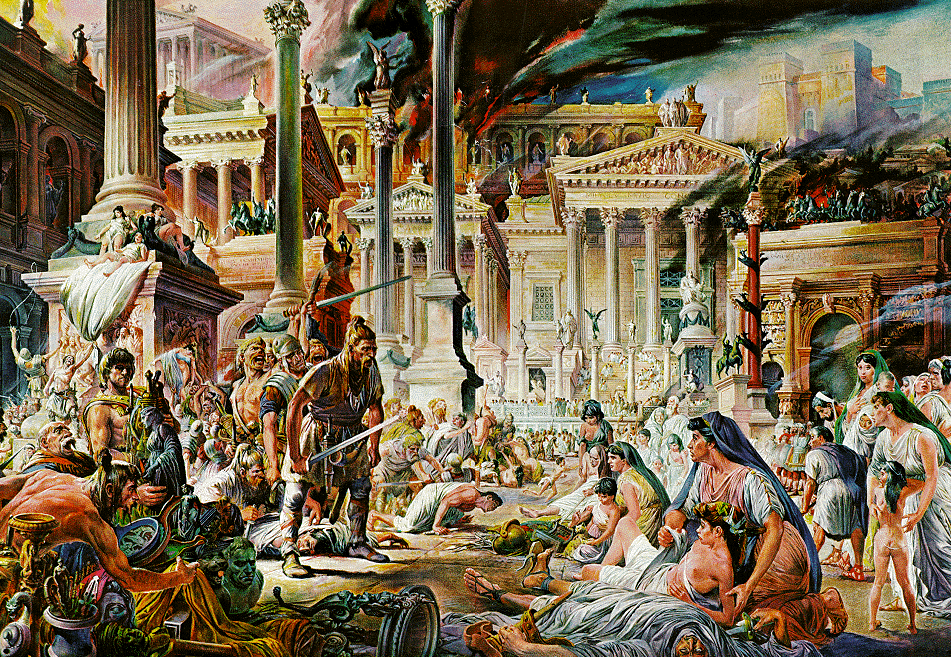Persian Fire, and our own
I enjoyed Tom Holland's Rubicon (about the fall of the Roman Republic) a few years ago, and I just enjoyed his Persian Fire (about the Greco-Persian Wars) even more. Holland starts out with a deep exploration of the backgrounds of the various combatants (Persia, the Babylon Persia incorporated into its empire, Athens, and Sparta), pointing up the idiosyncrasies of each society. Then he shows how they moved into conflict.
Aristagoras, tyrant of Miletus and a Persian dependent, launched a Persian-supported invasion of the Greek island of Naxos to bolster his own position: Miletus was on the verge of civil war between democratic forces and aristocrats. The invasion failed, and, to avoid being deposed, he incited the Ionian Greek cities of Asia Minor to revolt against Persia--"Wag The Dog"-like invasions of other parties to distract from domestic problems have a long history. Athens joined the Ionians in burning the imperial city of Sardis, an unmotivated act of terrorism from the Persian perspective. What had they ever done to Athens, after all? The ill-organized Ionians were quickly defeated, and Darius of Persia turned his attention to the trouble-fomenting Greeks of the mainland. A small invasion of 490 BCE (which would have been substantially larger if it hadn't been for a storm that sank much of the fleet) ended at Marathon, and was followed by the big one of 480 BCE, under his son Xerxes.
No matter how often you read it, it's a stirring story. Holland is particularly good on the sense of encroaching doom as the Persians approach on the great invasion of 480. Getting this huge army across the Hellespont was an incredible act of engineering. The Greek states were divided, both between themselves, and internally, between various aristocrats and popular forces, just as the Ionian cities had been. Many made accommodations with the Persians. Even the force of Spartans, Athenians, and other allies was constantly riven by dissension, mistrust, and arguments about proper strategy. One failure could doom Greece, and leave it as just another Persian satrapy. Terror was everywhere.
What should have been a long action in the narrow passage of Thermopylae, forcing the Great King's huge army to winter in Thessaly, was instead quickly crushed. Athens was torched. Xerxes could have moved on to landings in the Peloponnese and the encouragement of anti-Spartan states to revolt. Instead, he went for a high-stakes naval battle at Salamis, and lost. His general, Mardonius, lost the battle of Plataea the next year, and the Persians never returned to Greece.
Afterward, the Greeks characterized the Persians as effeminate and luxury-loving (a characterization that persists, showing up in movies like 300). Xerxes committed hubris, they said, by symbolically lashing and then binding the waters of the Hellespont after a storm sank an early model of the huge bridge that brought his army across (I suspect this was a regular magical practice, only remarked on if you lose your army afterward). It was natural that manly Greeks would triumph. A lot of that swaggering had to come from the terror they were trying to forget.
Great empires inevitably suffer from overstretch, and can be defeated, sometimes dramatically, despite their great power. A few generations later, Athens followed Xerxes's example in the Sicilian Expedition, helping to end its own empire. History offers lessons, certainly, but unfortunately there are so many contradictory ones that you don't know which one you should learn from until it's too late.
Holland does not push any comparisons with our own dominant nation, but they certainly come to mind, particularly when you reflect that Athenian forces helping burn Sardis in an act of terrorism was what set Darius and Xerxes off on their mission of preemptive state building. What stories will Afghani or Iraqi historians of the far future tell of the great empire that blundered around their landscape for those few years in the early 21st century?
I was riveted by the story, even though I knew how it came out. Great job from Holland.



